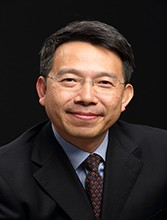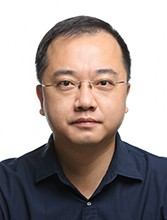Climate and Environment
Introduction
CAS-TWAS Center of Excellence for Climate and Environmental Sciences (ICCES) focuses its research on the key scientific problems related with global climate and environmental changes and takes the basic theory of Earth system dynamics, the development and application of Earth system dynamics models, natural cybernetics theory and its application in the regulation of meteorological environmental disasters as its disciplinary positioning. It aims to build an open scientific research platform for scientists to participate in, which will be applied to future climate, ecology, and environmental change prediction research, and provide a scientific basis for the protection, improvement, and regulation of the whole climate, ecology, and environment, sustainable economic and social development, and diplomatic negotiations and decision-making on global change issues.
Research direction
Development Of Dynamical Earth System Model and Numerical Simulation
Meteorological and Environmental Forecast and Related Disaster Assessment Theory
Technique, Data Assimilation Theory
Earth System Theory and Natural Cybernetics
Team

Prof. ZENG Qingcun, academician of the Chinese Academy of Sciences, academician of the Academy of Sciences of developing countries, foreign academician of the Russian Academy of Sciences, academician of the International Eurasian Academy of Sciences. He has made creative contributions to atmospheric dynamics, earth hydrodynamics, numerical weather prediction theory, climate numerical simulation and prediction theory, computational mathematics, atmospheric remote sensing theory and natural cybernetics. His achievement "Research on the adaptive process of motion in the rotating atmosphere" won the prize of the science conference in 1978 and the second prize of the National Natural Science Award in 1988; "Principle of infrared atmospheric telemetry" won the prize of 1978 Science Conference and the third prize of National Natural Science (part); "Research on primitive equation numerical weather forecasting method" won the prize of the scientific conference in 1978; In addition, he won four first prizes of the natural science award of the Chinese Academy of Sciences: "the evolution process of atmospheric disturbance and its interaction with basic flow" (1988), "Research on computational earth hydrodynamics" (1989), "design of atmospheric circulation model and basic climate numerical simulation" (1990), "Research on climate system model, climate numerical simulation and climate prediction theory" (1998), He won the He Liang He Li science and Technology Progress Award in 1995, the honorary member of the American Meteorological Society in 2013, the 61st World Meteorological Organization (IMO) Award in 2016 and the national highest science and Technology Award in 2019. Now he is the chief scientist of the large scientific device of "numerical simulation of earth system".

Prof. LIN Zhaohui received his B.S. from the University of Science and Technology of China in 1990, and his Ph.D. from the Institute of Atmospheric Physics, Chinese Academy of Sciences in 1995. He ever worked in the Bureau of Meteorology of Australia, the University of Nevada at Las Vegas, and City University of Hong Kong as visiting scholar. Currently, Prof. Lin is a member of the coordinating council of the Commission on Science and Technology for Sustainable Development in the South (COMSATS). He is also serving as deputy editor-in-chief of “Climatic and Environmental Research” Journal, an editor for the "Chinese Journal of Atmospheric Sciences" and "Journal of Meteorological Research". His research interests include the development of CAS Earth system model, climate and hydrological disasters forecast from subseasonal-to-seasonal time scale, atmosphere-land-hydrology interaction, dust aerosol and its interaction with climate. He has been the Principal Investigators for projects, including the CAS Strategic Priority Research Program, the international S&T Cooperation Program of China, and projects funded by the Ministry of Science and Technology and the National Natural Science Foundation of China. Prof. Lin has published more than 110 peer-reviewed papers in both international and domestic journals, and received the State Natural Science Award in 2005, the Award for Progress of Science and Technology by the Ministry of Education in 2006, and the outstanding Science and Technology Achievement Prize of the CAS in 2011.

Prof. ZENG Xiaodong is a member of the "Hundred Talents Program" of the Chinese Academy of Sciences and the deputy director of CAS-TWAS Center of Excellence for Climate and Environment Sciences. His main research areas are the vegetation ecological dynamics model, land surface process model, and vegetation atmosphere interaction in global change. He has served as a Corresponding Fellow of the Academy of Sciences of Developing Countries (TWAS, Young Affiliate), a member of the GEWEX Hydroclimatology Panel, a vice chairman of the China Committee of the Global Energy and Water Cycle Test Program (CNC-GEWEX), and a co-chair of the China Committee for the Integrated Study of Terrestrial Ecosystems and Atmospheric Processes (iLEAPS-China). Standing Editorial Board member of Climate and Environmental Research, etc. He has presided over 1 key project of the Natural Science Foundation and 1 key project of the Natural Science Foundation and participated in the 863 projects of the Ministry of Science and Technology, the National Key Research and Development Program, the Strategic Leading Science and Technology Project of the Chinese Academy of Sciences and the Important Direction Project of the Knowledge Innovation Project (all of which are the project leaders). In recent years, he has published more than 40 papers.

Prof. ZHENG Fei is deputy Director of CAS-TWAS Center of Excellence for Climate and Environment Sciences, he mainly engaged in short-term climate prediction, collective data assimilation and collective forecasting research. He is currently working for the SCI journal Adv. Atmos. He is a member of the editorial board of Sci., a standing editorial board member of the domestic core journal Atmospheric Science, and the deputy secretary-general of the Ocean and Climate Branch of the China Ocean and Limnology Society. He has successively won the National "100" Outstanding Doctoral Dissertation Award, the Chinese Academy of Sciences "Lu Jiaxi" Young Talent Award, the National "Top Ten" Outstanding Young Meteorological Science and Technology Workers, the First Prize of Meteorological Science and Technology Progress Achievements (the first completer), the "Zhao Jiuzhang" Outstanding Young and Middle-Aged Science Award, etc., and has been selected as the first batch of national "Ten Thousand People Plan" young talents and the fourth batch of "Ten Thousand People Plan" scientific and technological innovation leading talents. He has presided over and participated in the key research and development programs of the Ministry of Science and Technology, the National Natural Science Foundation of China, the Chinese Academy.

Prof. ZHANG He is deputy director of CAS-TWAS Center of Excellence for Climate and Environment Sciences. His research area is numerical simulation and diagnostic analysis of atmospheric circulation patterns. He is mainly engaged in the research and development of atmospheric circulation model and the coupling development of Earth system model, as the main finisher, he has completed the design of atmospheric circulation mode IAP AGCM4.0 IAP AGCM4.1 and IAP AGCM5.0. The model has been widely used and well evaluated in domestic and foreign units such as the General Staff Meteorological and Hydrological Bureau, the PLA University of Science and Technology, and Stony Brook University in the United States. He is now a core R&D member of the CAS-ESM R&D team of the Earth System model of the Chinese Academy of Sciences, responsible for the DECK test of CMIP6, the simulation test of the 20th century and the GMMIP test of the use of this model. He has presided over or participated as a backbone in projects such as natural science foundation projects, key projects, 863 projects, 973 projects, strategic science and technology pilot projects, and national key research and development programs, and published more than 30 academic papers.